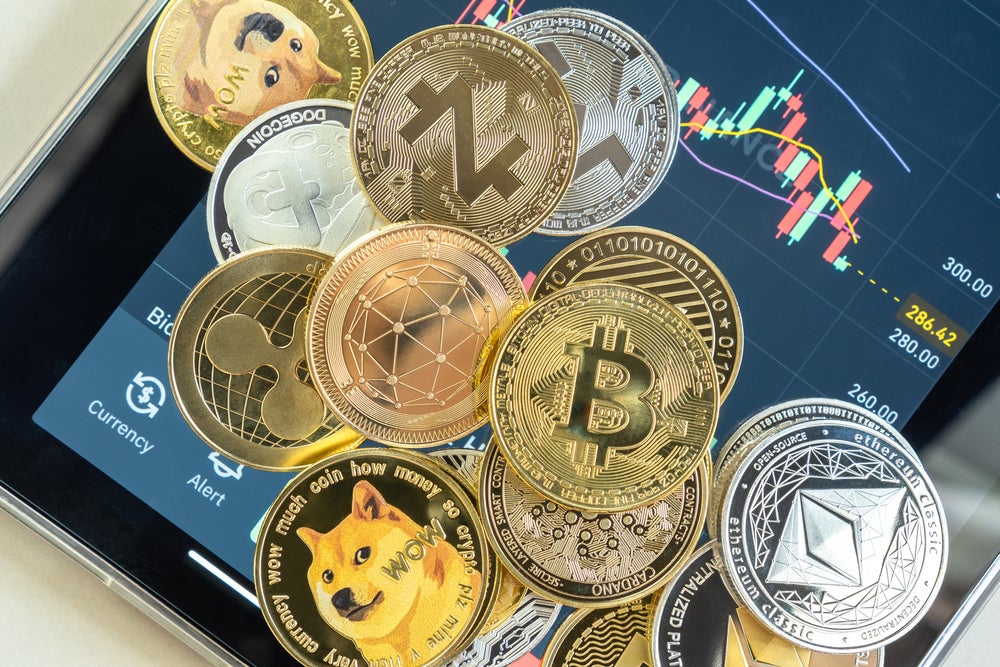Crypto
Sam Bankman-Fried built ‘pyramid of deceit’, jurors hear in closing arguments

Sam Bankman-Fried’s crypto fraud trial neared its end with closing arguments on Wednesday in Manhattan federal court following weeks of testimony that lifted the veil of FTX’s stunning collapse – and a broader murkiness surrounding digital currency markets. The prosecution quickly painted Sam Bankman-Fried as an unabashed scammer rather than the image of the wayward math nerd proffered by the defense throughout the trial, saying he created a “pyramid of deceit” with his cryptocurrency exchange, FTX.
Assistant US attorney Nicholas Roos also used Bankman-Fried’s own testimony against him.
“FTX was bankrupt. Billions of dollars from thousands of people, gone,” Roos said. “He spent his customers’ money, and he lied about it.”
Just before 10am, Roos started his closing argument by describing the final days of FTX in November last year, which started with the crypto equivalent of a bank run.
Exchange customers learned in a Coin Desk article that Alameda Research, FTX’s sister hedge fund, held billions in FTX’s own cryptocurrency, FTT, and had used it as collateral for hefty loans. Following the report, the Binance chief executive, Changpeng Zhao, tweeted that his exchange would unload its $500m in FTT holdings. FTT crumbled, bringing FTX and Alameda down with it.
“With each day, the withdrawals grew – millions of dollars turned into hundreds of millions of dollars, which turned into billions of dollars. Thousands of people around the world were trying to withdraw their investments, their savings, their nest eggs for the future, but their withdrawals were not being processed. Money wasn’t being returned,” Roos told jurors.
“They were overcome with anxiety. With each additional click of the withdrawal button their dread turned into despair. Their money was gone.”
Bankman-Fried faces seven counts on conspiracy and fraud charges for allegedly siphoning FTX customer funds into Alameda; the prosecution contends that he did so to cover Alameda’s widening debt following the spring 2022 crypto crash. He has pleaded not guilty.
Roos described Bankman-Fried’s alleged antics as “a pyramid of deceit built by the defendant on a foundation of lies and false promises, all to get money. Eventually it collapsed, leaving countless victims in its wake.
“The defendant is responsible,” Roos said, pointing to Bankman-Fried at several points.
When Bankman-Fried’s lawyer, Mark Cohen, presented his closing, he in effect argued that the prosecutor’s case hinged too heavily on Bankman-Fried’s scruffiness rather than the substance of his actions. Cohen argued: “The government has sought to turn Sam into some sort of villain, some sort of monster.
“Testimony about his hair, his clothes, testimony about his sex life, photos of him with big hair, photos of him with messy hair, photos of him with playing cards,” Cohen said. “His appearance and his romantic relationships have nothing to do with whether he’s guilty to the specific charges in the indictment.”
“We’ll agree that there was a time when Sam was probably the worst-dressed CEO in the world and had the worst haircut … and we’ll agree that Sam would talk to just about everyone … and that made his life messy … but that’s not a crime,” Cohen said.
“The reason the government focused so much of its case on Sam’s appearance is because every movie needs a villain.”
Cohen repeatedly told jurors that Bankman-Fried was acting in good faith and insisted this was a defense to the charges in this case. The attorney said he wanted to show jurors “an alternative way to think” about what happened as well as Bankman-Fried’s behavior on the witness stand. He said that Bankman-Fried’s testimony before lawmakers showed that he wasn’t a cunning criminal.
“If he was a criminal mastermind, why in the world would he go in front of Congress and [be] subject to public questioning when he didn’t have to?” Cohen said. “The answer? He wouldn’t.”
Cohen also rejected the government’s contention that Bankman-Fried lined his pockets and bolstered a luxe lifestyle using customer money.
While the government portrayed Bankman-Fried’s spending hundreds of millions in marketing as an “aha!” moment, to purportedly show his misuse of this money, Cohen said, he thought marketing costs were in keeping with the industry.
Cohen also addressed the sprawling Bahamas properties, including a $30m apartment Bankman-Fried lived in with top FTX executives, downplaying their purpose as workmanlike.
“Why did Sam purchase these properties? Why did FTX purchase them? “ Cohen said.” Sam is clear on this in his testimony – the Bahamas real estate was corporate housing for FTX employees.”
FTX, he said, was trying to court top professionals who “uprooted their lives” to move there when they could just have easily gone to work at Google or Facebook.
The prosecution also argued in closing that Bankman-Fried’s decision to testify in his own defense last week – a rare move for criminal defendants, given the perils of cross-examination – was not worth the risk.
“The defendant took the stand and he told a story – and he lied to you,” Roos said of Bankman-Fried’s direct testimony. “Did you see on Friday how his testimony was smooth like, it’d been rehearsed a bunch of times?”
Roos noted that Bankman-Fried testified about “a bunch of things that didn’t really matter” for the case – like his bookish living situation at MIT. And when it came to explaining various things during direct examination, he appeared to have “perfect memory”.
“He never said he couldn’t recall,” Roos said, but when it was prosecutors’ turn, this professed lack of memory “happened over 140 times during his cross-examination”.
“He had to be asked and re-asked. He looked away. He lied about big things and he lied about little things,” Roos argued. “He asked for terms to be defined that he used freely on direct examination earlier.
“He approached every question like up was down and down was up … he came up with a tale that was conveniently put together in a story that excluded him from a fraud,” Roos continued.
Cohen tried to downplay Bankman-Fried repeatedly saying he didn’t recall facts during cross-examination. He said, “if he remembered something he told you, if he didn’t remember something he told you as well.”
The prosecutor argued that Bankman-Fried used hi-tech subterfuge to cheat customers who trusted that FTX was as safe as he claimed – and treated their money as “his personal piggy bank”.
Alameda, FTX’s sister hedge fund, was able to borrow exchange customer money and rack up debt on a whopping $65bn line of credit, unlike other exchange clients.
“He set up a system, a public system, for everyone and a secret system just for Alameda, and he directed others to make it work that way,” Roos said. “No other customer had a set-up like Alameda.”
There was also the liquidity issue. FTX had a system that barred customers from continued margin trading when their liquidity dipped below a certain level; this was not the case with his hedge fund.
“He know that Alameda was exempt from the rules that applied to all the other customers,” Roos said. “What is the result of Alameda’s secret exemption? The defendant took billions of dollars of customer funds, leaving an enormous gap between what it said it had … and what it actually had in cryptocurrency wallets.”
All the while, Bankman-Fried was peddling a false sense of security, Roos argued.
“He ran ads saying FTX was safe, the safest and easiest way to buy and sell cryptocurrency he told Congress and the public by, quote, ‘logging into a customer account at FTX customers can immediately view assets they own held in custody at FTX,” Roos said. “That last part is critical – assets they own, held in custody by FTX.
“That wasn’t true. When customers logged into their account they saw a balance. Behind the scenes, that money wasn’t there.” Ads featuring the Seinfeld creator Larry David and football legend Tom Brady were part of this web of deception.
Roos also argued: “He was taking money from FTX customers when he was saying something different publicly – that makes him guilty of fraud.”

Crypto
Top Trader Ditches Bitcoin For Altcoins, 'Dogecoin Killer' Shiba Inu's Potential Breakout And More: This Week In Cryptocurrency

The week was a rollercoaster ride in the world of cryptocurrency. From a top trader’s surprising move to a CEO’s political warning, the crypto market was buzzing with activity. Here’s a quick recap of the top stories that made headlines.
Top Trader Ditches Bitcoin for Altcoins
Renowned cryptocurrency trader Michael van de Poppe shocked the market by announcing that he had sold all his Bitcoin holdings to invest in altcoins. Despite Bitcoin’s recent weak price action, Van De Poppe clarified that his decision was not due to a loss of faith in Bitcoin. Read the full article here.
Uniswap CEO’s Political Warning
Hayden Adams, CEO of Uniswap UNI/USD, criticized the Biden administration for underestimating the political significance of cryptocurrency. Adams likened the administration’s oversight to a severe strategic miscalculation, expressing concern that this could alienate a significant voter base and impact campaign funding. Read the full article here.
See Also: ‘Dogecoin Killer’ Shiba Inu Pumps 6%: ‘I Felt Underexposed,’ Says Trader Who Sees More Short-Term Upside
Millionaire Trader’s Meme Coin Success
Trader ‘Bonk Guy’ revealed a seven-figure profit in 48 hours trading AMC AMC/USD and GameStop GME/USD derivatives on Solana. Bonk Guy invested around $155,000 in trade, which is currently worth $1.3 million, marking 641% gains. He believes the real “meme coin season” hasn’t even begun yet. Read the full article here.
‘Dogecoin Killer’ Shiba Inu’s Potential Breakout
Crypto trader Javon Marks predicts that ‘Dogecoin Killer’ Shiba Inu SHIB/USD could surpass its all-time high of $0.000088598, implying a price appreciation of over 282% from current levels. Marks suggests that the meme coin is currently in an “intermission” phase before continuing its upward trajectory. Read the full article here.
Dogecoin’s Potential Resurgence
Crypto Kaleo expressed his belief in Dogecoin’s DOGE/USD resurgence, attributing it to the retail sector’s renewed risk appetite. He emphasized Dogecoin’s enduring relevance, stating, “Dogecoin isn’t dead. As soon as it starts to catch a bit of a bid, it will move vertical once again.” Read the full article here.
Read Next: Donald Trump’s Election Odds Just Spiked To 51% According To This Crypto Prediction Market
Read Next: Why This Crypto Market Is ‘A Bear Trap’ And Which Coins This Trader Is Backing
Image via Shutterstock
Engineered by
Benzinga Neuro, Edited by
Anan Ashraf
The GPT-4-based Benzinga Neuro content generation system exploits the
extensive Benzinga Ecosystem, including native data, APIs, and more to
create comprehensive and timely stories for you.
Learn more.
Crypto
Crypto lender Genesis to return $3 billion to customers in bankruptcy wind-down

Crypto lender Genesis Global received a significant victory in bankruptcy court on Friday, securing approval for its liquidation plan that will return approximately $3 billion in cash and cryptocurrency to its customers. The ruling, however, delivers a blow to Genesis’s owner, Digital Currency Group (DCG), which will receive no recovery from the bankruptcy.
U.S. Bankruptcy Judge Sean Lane overruled DCG’s objection to the plan, which centred on the valuation of crypto assets. DCG argued that customer claims should be capped at the value of cryptocurrencies in January 2023, when Genesis filed for bankruptcy. Crypto prices have surged since then, with Bitcoin, for example, rising from $21,084 in January 2023 to its current price of around $67,000.
Judge Lane rejected DCG’s argument, stating that even with the lower valuation, Genesis would have to prioritise paying other creditors, including federal and state financial regulators with claims totalling $32 billion, before distributing funds to its equity owner.
“There are nowhere near enough assets to provide any recovery to DCG in these cases,” Judge Lane wrote in his ruling.
Genesis aims to return funds to customers in cryptocurrency wherever possible, although it lacks sufficient crypto assets to fully repay all outstanding claims.
Sean O’Neal, an attorney representing Genesis, refuted DCG’s assertion that customers could be paid in full based on the lower January 2023 valuations. “We don’t buy into the idea that claims are capped at the petition date value,” O’Neal stated.
Genesis initially estimated in February that it could repay up to 77% of the value of customer claims, subject to future fluctuations in cryptocurrency prices.
This court approval marks a significant step forward in the resolution of Genesis’s bankruptcy, providing much-needed relief to its customers while leaving its owner, DCG, without any financial recovery.
Crypto
Venezuela to shut down cryptocurrency mining farms

Venezuela’s Ministry of Electric Power announced it would disconnect all cryptocurrency mining farms from the national power grid (SEN, Sistema Electrico Nacional). The measure aims to control the high energy demand from these mining farms and ensure reliable service for citizens.
AlbertoNews, a local media outlet, reported the announcement on May 18.
“The purpose is to disconnect all cryptocurrency mining farms in the country from the SEN [National Electrical System], avoiding the high impact on demand, which allows us to continue offering an efficient and reliable service to all the Venezuelan people,”
the Ministry reported in its account in Instagram.
Notably, the announcement followed the seizure of 2,000 cryptocurrency mining machines in the country. This action is part of the government’s ongoing anti-corruption campaign. Leading to the arrests of several officials from state institutions.
Corruption with the National Superintendency of Cryptoassets
The National Superintendency of Cryptoassets (Sunacrip) has been under a restructuring board since the arrest of Superintendent Joselit Ramírez. Ramírez has connections to Tareck El Aissami, former Petroleum Minister and former president of Petróleos de Venezuela (PDVSA).
On that note, El Aissami was charged with treason, embezzlement, misuse of influence, money laundering, and criminal association.
Venezuela power grid issues and cryptocurrency mining
Venezuela has faced an ongoing electricity crisis since 2009, worsened by massive blackouts in 2019 that left cities without power for up to seven days. Frequent power outages have negatively affected the country’s quality of life and economic activities.
Therefore, Governor of Carabobo state, Rafael Lacava confirmed restrictions on cryptocurrency mining farms due to their significant electricity consumption. He urged residents to report illegal cryptocurrency mining operations to prevent power shortages.
“If you, neighbor, see a house that you know, tell that person to turn off the farm, or else report it, because when they turn off the light, because you have to give light to a man so that he can earn some reales (money), you are left without electrical service.”
– Rafael Lacava
As reported by AlbertoNews, experts attribute the crisis to poor maintenance and inadequate investment in the power grid. Meanwhile, the government blames sabotage and has promised to modernize the state-controlled power network.
Overall, Bitcoin (BTC) and cryptocurrency mining are known worldwide for their high energy consumption. Countries like China and Cazaquistan have banned the activity to preserve their power grids, centralizing mining in fewer locations.
Therefore, the fewer countries allowing this activity, the higher the security concerns will be, as a few miners dominate block discovery.
-

 Finance1 week ago
Finance1 week agoSpring Finance Forum 2024: CRE Financiers Eye Signs of Recovery
-

 World1 week ago
World1 week agoIndia Lok Sabha election 2024 Phase 4: Who votes and what’s at stake?
-

 Politics1 week ago
Politics1 week agoBiden’s decision to pull Israel weapons shipment kept quiet until after Holocaust remembrance address: report
-

 News1 week ago
News1 week agoTornadoes tear through the southeastern U.S. as storms leave 3 dead
-

 News1 week ago
News1 week agoThe Major Supreme Court Cases of 2024
-

 World1 week ago
World1 week agoA look at Chinese investment within Hungary
-

 Politics1 week ago
Politics1 week agoTales from the trail: The blue states Trump eyes to turn red in November
-

 World1 week ago
World1 week agoBorrell: Spain, Ireland and others could recognise Palestine on 21 May














